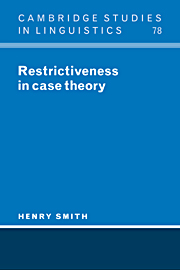3 - A typology of case systems
Published online by Cambridge University Press: 04 November 2009
Summary
This chapter will explore some consequences of the theory introduced in the previous chapter. There each case was associated with certain syntactic features, implemented there as the value of the feature link, which determine that case's syntactic behavior. In this chapter, I will extend this treatment of case to cover languages of different types and, in the next, to languages that make extensive use of linkers other than morphological cases.
By “languages of different types” I mean languages whose cases show superficial differences from the system introduced in the last chapter, which had a nominative for arguments and an accusative as default. Some languages have a default nominative rather than the default accusative. And in some languages, the case of the object of a transitive verb is the same as the case of the subject of an intransitive verb, and a different case marks the subject of a transitive verb. The former case would be called “absolutive,” the latter “ergative.” This chapter extends the particular system of Chapter 2 to cover all these types. The main result of this chapter is that a generalization of the theory of the last chapter involving just two parameters correctly predicts four main types of two-case system. This four-way typology will lead to a range of predictions about the behavior of case in individual languages.
In the next two sections, I will generalize the theory of linking and case frames already formulated and spell out the predictions it makes. Then I will present examples of each of the major predicted case systems and how the predictions fare in each of the languages considered.
- Type
- Chapter
- Information
- Restrictiveness in Case Theory , pp. 70 - 129Publisher: Cambridge University PressPrint publication year: 1996



